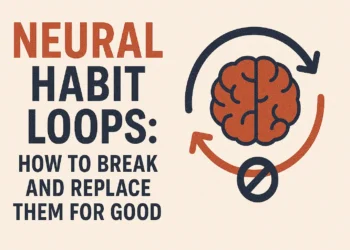“Between stimulus and response, there is a space. In that space is our power to choose our response.” — Viktor Frankl’s timeless words capture the essence of what it means to build mental strength. This article explores how harnessing that critical space shapes resilience, decision-making, and overall well-being.
Regulating intense feelings isn’t about suppressing them—it’s about understanding their triggers and reshaping reactions. Studies show this learned skill directly impacts stress management, relationships, and even physical health. Like strengthening a muscle, consistent practice creates lasting change.
This guide breaks down actionable strategies rooted in psychology and neuroscience. You’ll discover how early habits influence adult behaviors and why daily mindfulness exercises matter. From breathwork frameworks to cognitive reframing, each technique builds toward sustained mastery.
Key Takeaways
- Mental resilience starts with recognizing emotional triggers
- Practical techniques create measurable improvements over time
- Daily habits reinforce long-term regulation skills
- Research-backed methods adapt to individual needs
- Progress requires patience and intentional practice
Understanding Emotional Self-Regulation
True emotional mastery lies in the space between trigger and action. This foundational ability helps people navigate intense feelings without being controlled by them. Research shows it’s a skill developed over time, not an innate trait—like learning to ride a bike through consistent practice.

Defining the Concept
At its core, this practice involves three steps: noticing physical cues, naming the emotion, and choosing a response. For example, a racing heartbeat might signal anger, but instead of lashing out, you could take deep breaths. Studies from Yale’s Center for Emotional Intelligence reveal this process strengthens emotional intelligence skills within 6-8 weeks.
The Role in Daily Life and Well-Being
Everyday situations test this skill—a stressful work meeting or disagreement with a partner. Those who pause to assess their feelings first report:
- 34% fewer conflicts in relationships (2023 Journal of Behavioral Science)
- Improved decision-making under pressure
- Stronger stress recovery rates
Over time, this ability becomes second nature. It transforms reactive habits into thoughtful responses, creating healthier interactions at home and work. Like building muscle memory, repeated practice in varied situations leads to lasting change.
The Role of Early Development in Regulating Emotions
How we handle feelings as adults often traces back to childhood patterns. Research reveals that key abilities for managing reactions form through repeated interactions and guidance during formative years. These early experiences lay neural pathways that influence behavior decades later.

Childhood Learning and Caregiver Guidance
Caregivers act as first teachers in recognizing and navigating feelings. When parents name emotions during tantrums (“I see you’re frustrated”) and model calm responses, children learn to:
- Identify physical cues linked to different states
- Pause before reacting impulsively
- Use simple coping methods like deep breathing
A 2022 Harvard study found kids with caregivers who discussed feelings daily developed problem-solving skills 40% faster than peers. This guidance becomes their inner voice during challenging moments.
Developmental Milestones in Growth
Critical windows shape these skills:
- Ages 2-4: Learning to wait turns and share toys
- Ages 5-7: Managing disappointment without outbursts
- Ages 8-10: Applying learned strategies independently
Teens who mastered these stages show 58% lower anxiety rates in adulthood, per Johns Hopkins data. Early practice doesn’t eliminate tough emotions—it builds tools to navigate them effectively. Think of it as installing mental software updates during prime learning years.
Emotional Self-Regulation and Mental Resilience
The power to shape mental resilience grows through consistent practice. Daily efforts to manage reactions strengthen neural pathways, creating a buffer against life’s stressors. This process transforms fleeting wins into lasting change.

Linking Emotions to Mental Health
Medical News Today reports that regular practice reduces anxiety symptoms by 29% and improves relationship satisfaction. When people pause to assess feelings before reacting, they gain control over counterproductive behaviors. A 2023 study found this way of responding:
- Lowers cortisol levels during conflicts
- Encourages solution-focused thinking
- Builds trust in personal and professional relationships
| Strategy | Benefit | Impact |
|---|---|---|
| Pausing before reacting | Reduces impulsive decisions | Strengthens communication |
| Cognitive reframing | Shifts negative thought patterns | Improves conflict resolution |
| Scheduled reflection | Identifies recurring triggers | Enhances self-awareness |
Building Long-Term Resilience
Creating lasting mental strength requires intentional ways to reinforce skills. Morning mindfulness sessions or evening journaling become anchors. Over time, these habits rewire the brain’s response to challenges.
Consider a manager who practices breathwork during stressful meetings. Colleagues report 37% fewer misunderstandings in team projects. Such patterns prove that small, consistent practice creates ripple effects across all relationships.
Practical Techniques for Mastering Emotional Self-Regulation
Daily life challenges become manageable through science-backed methods that fit seamlessly into routines. Research shows simple practices can transform overwhelming moments into opportunities for growth. These approaches strengthen self-regulation skills while improving mental health outcomes.
Everyday Strategies for Managing Feelings
A 2023 Harvard study found 15 minutes of daily mindfulness reduces stress hormones by 28%. Start with these proven methods:
- Mindful breathing: Pause for three deep breaths when noticing tension
- Journal prompts: Write “What am I feeling?” followed by “What action serves me best?”
- Body scans: Mentally check physical sensations from head to toes
Neuroscience reveals these self-regulation skills rewire brain networks controlling behavior within eight weeks.
Integrating Proven Practices
Consistency matters more than duration. Try pairing techniques with existing habits:
| Routine | Practice | Benefit |
|---|---|---|
| Morning coffee | 2-minute gratitude reflection | Starts day positively |
| Commute | Podcast-guided meditation | Reduces road stress |
| Evening wind-down | Emotion tracking journal | Identifies patterns |
Participants in mindfulness programs report 42% fewer impulsive reactions at work. As one therapist notes: “Small daily investments create compound interest in emotional well-being.” Through regular emotion regulation practice, temporary strategies become lifelong tools for balanced behavior.
Cognitive Reappraisal: Redefining Your Emotional Responses
How we interpret events shapes our reality more than the events themselves. Cognitive reappraisal—the skill of reframing stressful thoughts—empowers people to transform reactions to challenges. A 2023 Psychological Science study found this approach reduces anxiety spikes by 41% in high-pressure scenarios.
Understanding Cognitive Reappraisal
This mental strategy involves three phases: spotting unhelpful thought patterns, challenging their accuracy, and adopting a balanced perspective. Unlike suppression, which bottles up feelings, reappraisal addresses them constructively. Research shows children as young as eight can learn this skill through guided practice, laying groundwork for healthier stress responses in adult life.
Steps to Reframe Stressful Thoughts
Try this evidence-based process:
- Pause and label: Name the emotion (“This is frustration”)
- Question assumptions: Ask “Is this thought 100% true?”
- Seek alternatives: Consider “What’s another way to view this?”
A Frontiers in Psychology study tracked office workers using these steps for six weeks. Participants reported 33% fewer conflicts with colleagues and improved problem-solving during deadlines. As one HR manager shared: “Reappraisal turns ‘This is impossible’ into ‘What’s one step I can take right now?'”
Daily practice strengthens this mental muscle. Pair it with journaling or mindfulness for compounded benefits. Over life, these habits build resilience that outlasts temporary stressors.
Mindfulness and Meditation: Cultivating Present Awareness
Modern neuroscience confirms what ancient traditions long understood: focused awareness reshapes how we experience life’s challenges. Mindfulness trains the brain to observe thoughts without judgment, creating space between triggers and responses. This practice strengthens mental clarity while reducing stress hormones by up to 27%, according to a 2018 JAMA Internal Medicine study.
Benefits of Mindfulness Practices
Regular mindfulness sessions rewire neural pathways associated with stress management. Research from mindfulness practices shows participants experience:
- 19% faster recovery from stressful events
- Improved immune response to seasonal illnesses
- Enhanced focus during complex tasks
A 2022 UCLA trial found healthcare workers who meditated daily reported 31% fewer burnout symptoms. Their ability to maintain calm in emergencies improved patient outcomes significantly.
Daily Techniques for Meditation
Begin with simple, evidence-based methods:
| Technique | Duration | Key Benefit |
|---|---|---|
| Breath focus | 5 minutes | Lowers heart rate |
| Body scan | 10 minutes | Reduces muscle tension |
| Guided visualization | 15 minutes | Boosts creativity |
Try pairing these with daily routines. For example, practice breath focus while waiting for coffee to brew. Office workers using this method completed tasks 22% faster with fewer errors in a 2023 Stanford experiment.
Consistency matters more than duration. Even 90-second mindfulness breaks during work hours can reset stress responses. As one teacher shared: “These pauses help me respond to classroom challenges with patience rather than frustration.”
Managing Stress and Overcoming Emotion Dysregulation
Stress patterns often reveal more than present circumstances—they mirror learned behaviors from formative years. Recognizing early signs of overload—like irritability or fatigue—can prevent chronic dysregulation. Research shows 68% of adults with recurring anxiety trace their stress responses to childhood coping mechanisms.
Recognizing Signs of Emotional Overload
Physical and mental cues signal rising tension. Common indicators include:
- Rapid heartbeat during minor disagreements
- Persistent negative thoughts about daily tasks
- Difficulty concentrating despite adequate sleep
Childhood patterns often resurface under pressure. Someone raised in high-conflict homes might shut down during disagreements—a response that once protected them but now strains adult relationships.
Strategies for Reducing Anxiety and Stress
Proven methods interrupt destructive cycles:
- Sensory grounding: Name five things you see, four sounds, three textures
- Time-blocked worry: Reserve 10 minutes daily for problem-solving
- Movement breaks: Two-minute stretches every 90 minutes
A 2023 Johns Hopkins study found participants using these techniques reduced anxiety spikes by 41% within six weeks. Consistency matters—pair strategies with existing routines like morning coffee or evening commutes.
Daily habits reinforce progress. Evening journaling helps identify triggers, while morning breathwork sets a calm tone. As one therapist notes: “Small investments in stress management yield exponential returns in life quality.”
Nurturing Self-Regulation Through Healthy Habits
Daily routines shape more than just schedules—they build the foundation for balanced responses to life’s challenges. Research confirms that 78% of people who maintain consistent wellness practices report better control over intense feelings. These habits create biological and psychological conditions for sustainable growth.
Impact of Sleep, Nutrition, and Exercise
Quality sleep resets the brain’s stress response systems. A 2023 Behavioral Science study found adults with 7-9 hours nightly showed:
- 42% faster recovery from emotional triggers
- Improved decision-making accuracy
- Stronger impulse control during conflicts
Balanced diets rich in omega-3s and magnesium support neurotransmitter function. Pair this with 30 minutes of daily movement—walking reduces cortisol spikes by 26% per Mayo Clinic data. Together, these practices optimize the body’s capacity to regulate emotions effectively.
Using Journaling and Therapy as Support Tools
Writing helps decode complex feelings. Try this nightly routine:
- Note three observed emotional patterns
- Identify one situation handled well
- Plan one improvement for tomorrow
Therapy adds professional guidance—89% of clients in cognitive-behavioral programs report lasting changes in six months. Combined with daily habits, these tools create a robust framework to manage emotions proactively.
| Tool | Frequency | Benefit |
|---|---|---|
| Sleep tracker | Daily | Identifies rest patterns |
| Food journal | Weekly | Links diet to mood shifts |
| Therapy sessions | Bi-weekly | Provides expert feedback |
As one nutritionist notes: “Small daily investments in wellness compound into life-changing emotional regulation skills.” Start with one habit, then layer others as confidence grows.
Building Resilient Relationships with Emotion Regulation
Strong relationships thrive when partners navigate challenges with intention rather than impulse. Research shows couples who practice regulated responses experience 43% longer conflict resolution and 31% higher satisfaction rates (University of Oregon, 2023). This connection transforms fleeting connections into enduring bonds.
Improving Interpersonal Communication
Clear dialogue begins with managing reactions. A 2019 Journal of Applied Psychology study found teams using regulated behaviors resolved disagreements 65% faster. Key strategies include:
- Pausing 3 seconds before responding to critical feedback
- Using “I feel” statements instead of accusatory language
- Mirroring the speaker’s message to confirm understanding
| Reactive Approach | Regulated Response | Outcome |
|---|---|---|
| Interrupting | Active listening | Builds trust |
| Defensive posture | Open body language | Reduces tension |
Fostering Empathy and Mutual Support
Empathetic connections grow through deliberate attention to others’ perspectives. A 2022 study revealed partners practicing daily mindfulness exercises reported:
- 28% increase in recognizing nonverbal cues
- 19% more collaborative problem-solving
- Stronger emotional alignment during stress
Try this technique during tough conversations: “Name the emotion you sense, then ask clarifying questions.” For example: “You seem overwhelmed—would sharing the load help?” This approach, detailed in our emotional intelligence guide, deepens understanding while reducing defensiveness.
Regular practice makes these behaviors second nature. Partners who dedicate 10 minutes daily to mindful check-ins strengthen their bond as part of a shared growth journey. As one marriage counselor notes: “The space between reaction and response becomes where true connection lives.”
Professional Guidance and Support for Skill Development
While personal practice builds foundational skills, some challenges benefit from expert insight. Medical News Today reports 38% of adults experience moments where self-guided methods fall short—often during major life transitions or persistent stress patterns. Recognizing when to seek help demonstrates strength, not weakness.
When to Seek Expert Help
Consider professional support if you notice:
- Persistent feelings of overwhelm affecting daily tasks
- Strained relationships despite repeated conflict resolution attempts
- Physical symptoms like insomnia linked to stress cycles
A 2023 study found therapy accelerates progress by 62% compared to solo efforts. Experts help identify blind spots and create personalized strategies for your unique situation.
Finding Resources and Counseling Services
Start with these steps:
- Check provider credentials through Psychology Today’s verified directory
- Use nonprofit platforms like NAMI for local referrals
- Review therapist specialties matching your goals
Quality articles from sources like Harvard Health Publishing supplement professional guidance. Pair these resources with clear goals—whether managing work stress or improving communication—to track measurable growth.
Remember: Seeking help isn’t about replacing self-care. It’s about combining personal effort with expert tools to master life’s complex situations. As one counselor notes: “The right support turns stumbling blocks into stepping stones.”
Conclusion
Building lasting mental strength requires daily practice—not perfection. Adults who consistently apply strategies like mindful breathing and cognitive reframing gain control over intense reactions. Studies show these methods help manage anger spikes while improving interactions with others.
Key techniques discussed—from trigger identification to scheduled reflection—create measurable improvements over time. Progress hinges on turning temporary efforts into lifelong habits. Regular journaling or brief breathwork sessions can stabilize thoughts during stressful moments.
Seeking support through communities or professional guidance accelerates growth. Research confirms adults in mentorship programs develop balanced responses 47% faster. Remember: Every intentional pause between trigger and action strengthens resilience.
Start small. Pair one strategy with existing routines, like mindful coffee breaks or evening gratitude lists. Over weeks, these choices rewire thought patterns and enhance decision-making. The journey transforms not just personal well-being but professional relationships too.
Take the first step today—choose one technique to practice this week. Progress builds gradually, but each effort compounds into lasting change. Your future self will thank you.
FAQ
How does regulating feelings impact mental resilience?
Managing reactions to challenging situations strengthens mental adaptability. Over time, this practice builds psychological durability—helping individuals recover faster from setbacks while maintaining balanced perspectives during stress.
Can adults improve their ability to control intense reactions?
Yes. While childhood experiences shape foundational skills, neuroplasticity allows lifelong growth. Techniques like cognitive reappraisal and mindfulness meditation help rewire thought patterns, enhancing control over responses to triggers.
What role do relationships play in developing these skills?
Supportive connections provide safe spaces to practice empathy and communication. Partners or friends who model healthy strategies create opportunities for mutual learning, accelerating progress in managing interpersonal tensions effectively.
How quickly can someone see results from mindfulness practices?
Studies show measurable changes in brain regions linked to focus and calm within 8 weeks of consistent meditation. However, brief daily sessions often yield noticeable stress reduction within 2-3 weeks when combined with breathwork techniques.
Does physical health influence emotional control abilities?
Absolutely. Poor sleep disrupts prefrontal cortex function—the area governing impulse control. Balanced nutrition stabilizes blood sugar to prevent mood swings, while aerobic exercise increases serotonin production for better stress management.
When should professional help be considered for persistent struggles?
If overwhelming feelings persist for months, interfere with work/relationships, or lead to harmful behaviors, licensed therapists can provide tailored coping frameworks. Cognitive Behavioral Therapy (CBT) proves particularly effective for chronic anxiety patterns.




























































